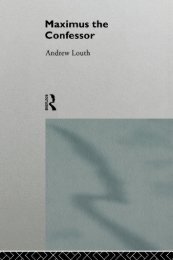Gospels of Thomas and Philip and Truth - Syriac Christian Church
Gospels of Thomas and Philip and Truth - Syriac Christian Church
Gospels of Thomas and Philip and Truth - Syriac Christian Church
You also want an ePaper? Increase the reach of your titles
YUMPU automatically turns print PDFs into web optimized ePapers that Google loves.
Let us now consider the following quite extraordinary entry in the <strong>Philip</strong> Gospel:<br />
‘Adultery occurred first, then murder. And (Cain) was begotten in adultery, (for) he<br />
was the son <strong>of</strong> the serpent. Therefore he became a manslayer just like his other<br />
father, <strong>and</strong> he killed his brother.’ (Ph 46). In whatever sense could it be said that<br />
Cain was born <strong>of</strong> the serpent?<br />
We may first call to mind one <strong>of</strong> the traditionally most difficult canonical<br />
passages, from John's Gospel: ‘You [unbelievers] are <strong>of</strong> your Father the Devil;... he<br />
was a murderer from the origin;... he is a liar <strong>and</strong> the Father <strong>of</strong> Lies’ (Jn 8:44).<br />
Utilizing this important parallel, to say that Cain was born <strong>of</strong> the serpent, is to say<br />
that he was born <strong>of</strong> a lie. In what sense, then, was Cain born <strong>of</strong> an untruth?<br />
Of consummate relevance here is the fact that ‘Cain’ in Hebrew signifies<br />
‘product’:<br />
zyq: ‘fit together, fabricate, make artificially, forge’, Hebrew-Aramaic <strong>and</strong> English<br />
Lexicon <strong>of</strong> the Old Testament (#8544), by Francis Brown, S.R. Driver<br />
<strong>and</strong> Charles A. Briggs, 1906; based upon Wilhelm Gesenius, Lexicon Manuale<br />
Hebraicum et Chaldaicum, 1833 (included in Biblio.29).<br />
So in the Genesis account, by giving the name ‘Cain’ to the infant, the woman<br />
<strong>and</strong> the man were saying that the child was at least in part their own creation: ‘I have<br />
produced a man with the help <strong>of</strong> Yahweh’, Gen 4:1— rather than entirely the Lord's<br />
creation, merely produced thru them: ‘You do not know how the spirit comes to the<br />
bones in the womb <strong>of</strong> a woman’, Ecc 11:5.<br />
And so they called themselves the parents <strong>of</strong> the child, rather than calling God<br />
its sole Parent. Furthermore, in so doing they forgot that God is their own Parent as<br />
well. And thus in turn they claimed complete moral authority over the infant as well<br />
as over themselves— judging good <strong>and</strong> evil like gods, instead <strong>of</strong> letting God alone<br />
proclaim judgment (Gen 3:5).<br />
This then was the Fall, the ‘original transgression’ <strong>of</strong> humankind in the remotest<br />
past: accepting the misconception called human generation, instead <strong>of</strong> the reality <strong>of</strong><br />
divine generation, down across the generations. ‘Whoever recognizes father <strong>and</strong><br />
mother, shall be called the son <strong>of</strong> a harlot’ (Th 105). Which confusion Christ came to<br />
rectify, by proclaiming that all humankind are in truth Angels born <strong>of</strong> God <strong>and</strong> thus<br />
Brothers <strong>and</strong> Sisters, rather than mere children <strong>of</strong> humans (see Mt 12:46-50 18:10<br />
23:9, Ph 64).<br />
119




